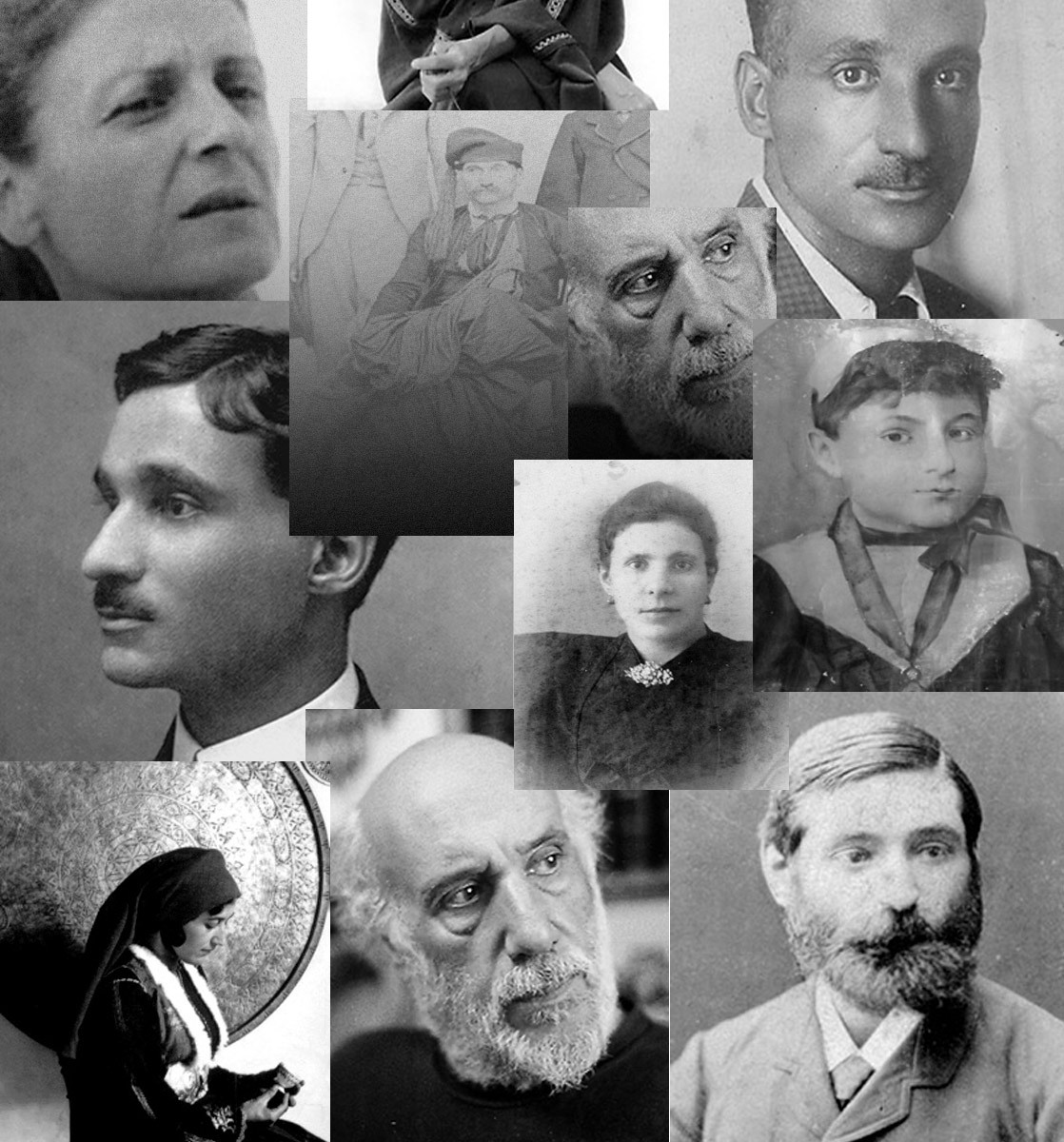
Georgantis Faltagis, Georgis Grimaldi, Dimitrios Faltaits, Anna, Maria and Ephrosyni Faltaits were some of the people that molded the personality of Manos Faltaits and contributed to the conception and implementation of the idea for creating this museum.
Faltagi Family
An old aristocratic Skyrian family with roots that go beyond the pre-byzantine archaeological era as the surname's etymology suggest.
In essence, the name 'Faltagis' either as a name or surname, is one of the very few Greek names that were salvaged after the domination of Christianity.
The first written reference of the name is found in 1643 when his ancestor Kyparissis Faltagis had been the head of the elders Skyrian delegates that went to Constantinople to regulate the issue of the establishement of the Turkish kadi.
Ever since and until 1821, members of the family have served as elders, secretaries and commissioners of Chora as well as village elders too.
Faltagis Stamatiou
During the critical years of the Kapodistrian period 1828-1831 one of the most dynamic personalities of Skyros was his great-great grandfather of Manos Faltaits, Faltagis Stamatiou.
He has been a dynamic and exuberant personality that delineates the history of the Faltaits' family from the early decades of 19th century, while he had a prominent and leading role in the public affairs of Skyros from the 1821's revolution and thereafter.
During the 1821 revolution he played a defining role as an elder and a keeper of the Castle, protecting Skyrians from the invasions of Liapidon and Pirates.
As harbor master of Skyros he had a significant role too to fighting piracy during the Kapodistria's era.
In 1838 he was appointed as an Attorney in fact of the island towards central administration.
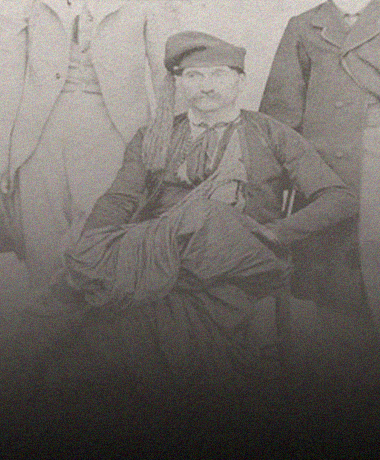
Georgantis Faltagis
He is celebrated among Skyrians who referred to his heroic deeds, as he was a well-known local hero like his father, elder Faltagis.
He took part in the revolution of 1821 - still a teenager - and fought among Karaiskakis' forces in Faliro against Turkish forces of Kioutachi during the Acropolis siege in 1827.
Georgis Grimaldi
The great-grandfather of Anna Faltaits Martselo-Grimaldi, and a close friend, brother in arms and collaborator of Augoustinou Kapodistria.
He played a leading role in the campaign for the liberation of Nafpaktos and of Messologi in 1828 as an immediate collaborator of Augoustinou Kapodistria.
With Augoustino, they saved the relic of the first governor of Greece Ioannis Kapodistrias from the eminent dishonoring of his dead body from his opponents in Nafplio.
Descendant of the hegemonic kin of Grimaldi of Monte Carlo and Genova, from the branch of Grimaldi of Chios.
The Grimaldis came in Chios, after the fall of Constantinoupoli from the Westerns of the 4th crusade in 1204, and belonged to the Maona (edit) of Chios.
The common family emblem of the two branches was the reborn eagle, with open wings, scarlet and golden rhombus.
The ancestors of Zorgi Grimaldi, fought against the Turks in 1453 as collaborating officers of Ioannis Ioustiniani, along with other Genouats of Chios, fighting at Romanos' Gate.
Some relics of George Grimaldi, are kept in Manos and Anastasia Faltaits' museum in Skyros.
His connection with the Viglatoria of Palaiopyrgos can be found from his direct descendancy from the members of Viglatoria of Palaiopyrgos but also from the many relics that are in the museum. Also because his personal stories were a permanent part of the teachings of family members and strongly influenced the formation of their ideological state and their principles.
Grimaldis' sword was a central element of that teaching.
Faltaits G. Dimitrios, Scholar (1855 - 1900)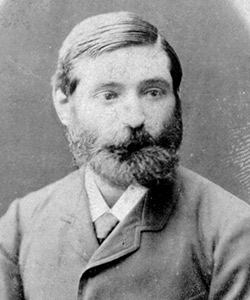
Born and died in Skyros. Married in Smyrni with Anna Martselo - Grimaldi.
He developed an intense social and intellectual presence in Smyrni as well as in Odessa and in Taigarog of Russia, cities where he developed his entrepreneurial activities.
In Taigarog he was closely attached with the eminent poet Achilea Parascho and the famous Russian writer Anton Chekhov and under his suggestion, his close friend Agathoklis Konstantinidis later translated Chekhov's works in the Greek language as well as the works of other famous Russian writers, introducing them to the Greek public.
He wrote the history of Skyros, philosophical essays, memoirs and developed a wealth of philanthropic and social activities along his intellectual one.
He left a lot of unpublished works:
Poems
Essays
Speeches
Teachings
The history of Skyros
Diaries (edit)
Traveling memoirs from Smyrni, Holy lands, Constantinople, Odessa, Trabzon, Mytilini, Chios, Athens etc.
Founder of the Intellectual Fraternity of Smyrni
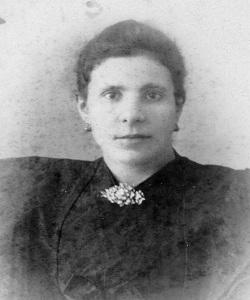 Faltaits Anna
Faltaits Anna
Born and raised in Smyrni, where he married Dimitrios Georganti Faltaits. Daughter of Nikolaos Martselo kai Maria Grimaldi.
In 1893 they moved to Skyros, home of the Faltaits kin.
Mother of Konstantinos Faltaits and Marias Faltaits.
She played a most important role in the intellectual and social life of Skyros until her death in 1944.
Well known are her letters to her son Konstantinos, where she urged him to undertake action for the salvation of
Skyrians from famine that plagued the island due to the British and German-Italian entrenchment of Greece during the 2nd World War.
She decisively influenced in her children teaching them altruism and hyper-consciousness.
A famous event in her life is her night pray in Paleopyrgos, at their home in Skyros, that performed with her four daughters during the winter of 1913, for the salvation of Greek soldiers that fought in Bizani against the cold and the Turks.
She is remembered among Skyrians as the great lady of Paleopyrgos.
Faltaits Maria (1883-1964)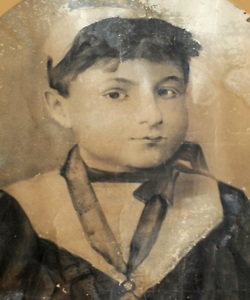
Born in Smyrni in 1883 and died in Skyros in 1964.
Daughter of the scholar Dimitrios Georgandi Faltaits and Anna Martselo of Nikolaos and Marias Grimaldi.
Along her parents moved to Skyros in 1893, the homeland of her father Dimitrios and all of the old aristocratic family of Faltagides to which she belonged.
During her life she developed intense social and intellectual actions and has been one of most prominent intellectual figures of Skyros from the early 20th century to her death in 1964.
She inspired and effectively helped Aggeliki Chatzimichali, a relative from her grandmother's Efrosyni Tzanou side in her famous work 'SKYROS'.
She worked closely with Eve Sikelianou and Aggeliki Chatzimichaly participating actively in the organization of the Delphian festivals, representing the traditions of her island.
She has been - along with her brother Konstantinos - the main organizer of the festival of 'Internal Poetry' that took place in Skyros in 1931 in honor of the English poet Robert Brook and internationally establishes Skyros as the island of Iternal Poetry end the El-Dorado of art.
She invented the great masonry rhythm known in Greece as Skyrian-Vyzantine, that was established in Greece ever since the middle-war times.
She created the 'Skyrian Home' in Skyros' town-hall that is now the island's Archaeological museum.
She contributed - along with her brother Konstantino- in the creation of the archaeological collection of Skyros, that now comprises the core of the local state Archaeological Museum.
She has for many decades been the most prominent intellectual person in the island, playing a leading role in all the social and cultural activities of Skyros' residents.
Her fame continues to be alive until today and her name is remembered by the older Skyrians with great respect, admiration and love.
Faltaits Eyfrosyne (1907 - 1986)
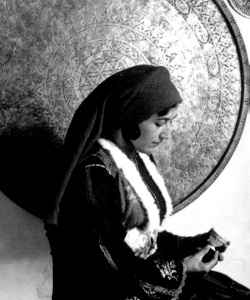 Born and died in Skyros.
Born and died in Skyros.
Daughter of Fragouli Konstantinou Malatesta - Fragouli and of Anna Grigoriadi. Spouse of Konstantinos Faltaits.
Greatly contributed in the organization of the Manos Faltaits' museum with her higher aesthetics and her deep knowledge in traditional culture, popular art and folklore of Skyros.
She donated a large number of relics, embroidery and other valuable artifacts, in the museum and has contributed effectively in the organization of its operations during its first functional years, teaching visitors the culture and the cultural heritage of the island.
